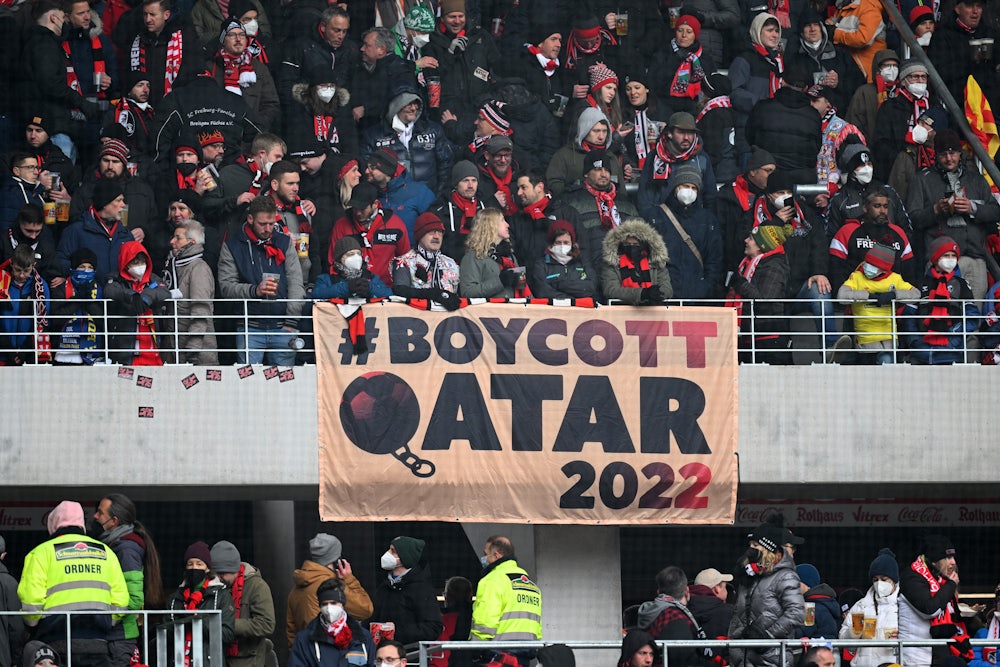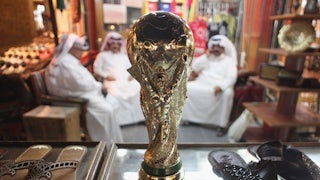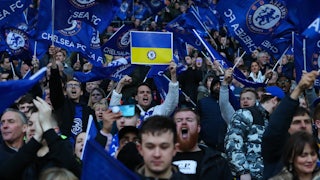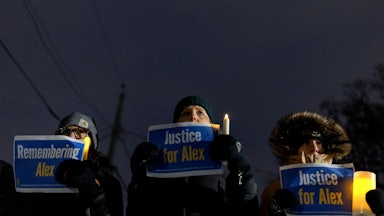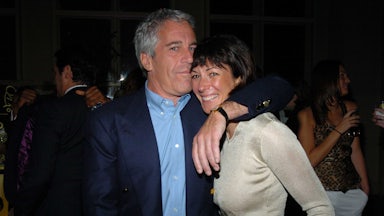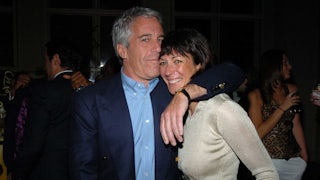A World Cup without beer is almost impossible to imagine. And yet that seems like exactly what will happen. On Friday, 12 years after it was awarded the 2022 World Cup and two days before the tournament was set to begin, its host, Qatar, abruptly announced that it would not serve alcohol at games held at the eight stadiums it built after being awarded the competition in 2012, a sudden and surprising reversal. “Following discussions between host country authorities and FIFA, a decision has been made to focus the sale of alcoholic beverages on the FIFA Fan Festival, other fan destinations and licensed venues,” FIFA, international soccer’s governing body, said in a statement. The decision, it said, would require “removing sales points of beer from Qatar’s FIFA World Cup 2022 stadium perimeters.”
There was a silver lining for Budweiser, which had paid FIFA $75 million for exclusive rights to sell alcohol. “There is no impact to the sale of Bud Zero which will remain available at all Qatar’s World Cup stadiums.” Surely the fans clamoring for the great taste of Budweiser will be happy with this zero-alcohol alternative. (The executive suites in Qatar’s World Cup stadiums, unsurprisingly, will still serve champagne and wine.)
The decision will no doubt anger tens, if not hundreds, of thousands of the one million fans who will travel to Qatar to watch the tournament, which is held quadrennially. And yet it is a minor inconvenience in comparison with the scandals that plague the Qatari tournament: the myriad human rights and labor abuses that have gone into it, the extreme restrictions placed on Qatari women, and the criminalization of homosexuality.
It is also a troubling sign that Qatar has apparently tired of doing what FIFA asks—the beer ban is perhaps best read as an assertion of independence. As The Athletic’s Adam Crafton tweeted, it may be minor, but it has far-reaching implications. “This is also why it was so dangerous of national associations to be speaking for Qatar in saying what would and would not be safe for LGBTQ fans,” Crafton wrote. “Because the goalposts move and the country itself does not offer on-record clarity.”
It’s also the latest sign that this World Cup will be a catastrophe, regardless of what happens during the actual games. The fan accommodations have a distinct Fyre Festival vibe; again, there will be no beer at the stadiums. And Qatar itself seems to be reeling from a spate of bad press around its aforementioned treatment of migrants, women, and LGBTQ+ people. Even before the World Cup has begun, the event has been overshadowed for entirely predictable reasons. FIFA only has itself to blame.
The World Cup, maybe more than any other sporting event, is about stories; the best World Cups almost always feature the best stories. Brazil’s victory in 1958 heralded the arrival of (arguably) the sport’s greatest player, a 17-year-old named Pelé. France’s in 1998 was a triumph of multiculturalism, with a diverse group of Frenchmen lifting the Jules Rimet trophy. At their finest, World Cup games feature individual performances that somehow encapsulate not just entire careers but whole individuals: If you want to understand the enigma of Diego Maradona, you have to take in both the Hand of God and the brilliant, mazy run that led to arguably the sport’s greatest individual goal, less than four minutes later. The enigma of Zinedane Zidane is similarly dialectical: a chipped-in penalty off the crossbar—the height of cheek in a World Cup final—at the start of the game and a head butt that likely cost France its second World Cup in three tournaments with 10 minutes to go before the game went to a penalty shootout.
It feels odd complaining about any World Cup, but 2018’s event, held in Russia and won by France, was pretty dull. That tournament will be remembered for the emergence of Kylian Mbappe—the first teenager to score in a World Cup final since Pelé did so 60 years earlier—but team performances (and by that I mean stodgy defensive ones) triumphed over the individual one. Aside from a Switzerland-Serbia game that, for a moment, felt like it could start World War III (thanks to Switzerland’s glorious collection of Albanian players), there are, four years later, few things I remember about it. There simply weren’t enough stories.
In 2022, things could very well be different. There seem to be plenty of narratives. This is likely to be the last World Cup featuring both Cristiano Ronaldo and Lionel Messi, neither of whom have ever won it. Ronaldo, playing for Portugal, has chosen to end his career by alienating everyone and has spent most of the last year (or more) as a kind of reverse King Midas on the pitch and a petulant child off it; Messi, on the other hand, has transformed himself, as he has so many times before, and is playing some of the most beautiful, creative soccer of his life. There is an ease and understanding between him and his Argentine teammates that hasn’t existed before. But if this is Messi and Ronaldo’s last World Cup, there is also the sense of a torch passing to a new generation: Mbappe, of course, Brazil’s Vinicius Jr., England’s Jude Bellingham, Spain’s Pedri, Germany’s Jamal Musiala—of these, Mbappe, at 23, is practically a wizened sage.
Messi’s Argentinian team are among the tournament’s favorites and could win their first tournament since a jubilant Maradona lifted the Jules Rimet trophy more than 30 years ago. Brazil, eight years after a 7–1 hiding in their home stadium (“The whole idea of Brazilian football was killed tonight,” former Arsenal manager Arsene Wenger said at the time. “It died.”), has reemerged, its soccer as jubilant and Brazilian as ever. The English national team remains as gripped by psychodrama and angst as ever; France, still perhaps the most talented squad, seems poised for one of its once-a-decade meltdowns and has been hit with a series of major injuries. The United States, back in the tournament after missing out in 2018, boasts its most talented team ever; this could be the moment a fun young squad announces itself—or gets overshadowed by a thrilling team from the Great White North. There is a sense that an underdog could sneak in—the Dutch, robbed in 1978, could perhaps snatch the trophy if they find someone to score; Denmark has been picked so many times as a “dark horse” that the term has lost meaning.
This World Cup should be fun and thrilling: I can’t think of another tournament with this many contenders. At the very least, there will be lots of soccer on for much of the day, if you’re into that kind of thing. (If you’re not, you should be—it’s great.) And yet, in spite of that, I’m not excited about it—in fact, I’m dreading it and have been for some time. And that’s because the real story of this World Cup isn’t about soccer at all—or at least not the game that will be played dozens of times in 90-minute blocks starting on Sunday.
This World Cup shouldn’t be happening now or in Qatar. FIFA awarded it to the tiny emirate in 2010 in the same vote that awarded the 2018 tournament to Russia. Of the 22 FIFA executive committee members who awarded those tournaments, 17 have been suspended, banned from football-related activities, or accused of corruption.
Sepp Blatter, the oily Swiss executive who oversaw soccer’s global governing body for nearly two decades and treated it like a private fiefdom, has been banned from the sport since 2015. We still don’t know precisely who bribed these officials, but we know why they did: Both Russia and Qatar have extensively used sports to distract from widespread human rights abuses. This is an old trick, especially when it comes to soccer: Think Munich in 1936; the 1978 World Cup, held by Argentina’s military dictatorship during its “dirty war”; and Manchester City, Newcastle United, and Paris St. Germain, soccer clubs owned by the United Arab Emirates, Saudi Arabia, and Qatar respectively. Russia’s sportswashing—the purchase of Chelsea F.C. by oligarch Roman Abramovich in 2003, the 2014 Winter Olympics, the 2018 World Cup—helped to bolster the dictatorship’s image. It invaded Crimea in 2014 and all of Ukraine earlier this year; it was only then that Russia was finally, belatedly exorcised from the soccer world.
This World Cup has been built by migrant labor. Many of these workers are paid a pittance—when they’re paid at all—and are treated as indentured servants, held for years as they pay back extortionate fees from “recruiters.” They live in squalor, have limited to no access to justice, and work constantly. Thousands of workers, many from Nepal, have died building the stadiums, according to multiple investigations. Qatar is a country in which homosexuality is illegal; where women cannot work, marry, or travel without a male guardian’s permission; and which has little freedom of speech or of assembly. FIFA, like most global soccer organizations, has spent much of the last decade trying to cast itself as inclusionary, with specific campaigns aimed at women and LGBTQ fans. And yet Qatar wouldn’t dream of hosting a Women’s World Cup. Gay fans risk imprisonment simply by attending to cheer for their countries.
The World Cup is being held in Qatar, a country the size of Connecticut, in winter—for the first time in its history—because it is too hot to play soccer there during the summer, when temperatures can reach 113 degrees. This is no surprise and was obvious in 2012 but was hand-waved amid fantastical, Elon Musk–ish claims of climate control and magic clouds. (Seriously.) This has led, thanks in part to greedy owners packing league schedules post-pandemic, to a horrific level of scheduling congestion: Many of the players on the field are exhausted after playing with little down time since June 2020. The first two months of this season have seen a shocking number of muscle injuries, and it’s highly likely that the tournament will as well. Even before it starts, many of the world’s best players will be absent: France’s dynamic midfielders N’Golo Kante and Paul Pogba; Portugal’s versatile striker Diego Jota; Senegal’s brilliant winger Sadio Mane are among the many who have been ruled out by injury.
The lead-up to the World Cup has been heartening in some ways. There has been a great deal of media coverage of both Qatar’s human rights abuses and FIFA’s corruption. (Gianni Infantino, who took over the organization from Blatter and pledged to clean it up, has been living in a penthouse in Qatar for several years.) Many previews of the tournament have also focused on the abuse of migrants, women, and homosexuals that is a part of this World Cup. But that is unlikely to continue once the tournament begins: Too much attention will be paid to the games. Some players, such as Portugal’s Bruno Fernandes and Dutch captain Virgil Van Dijk, have spoken out about human rights issues. Some teams, most notably Denmark and Australia, have been particularly outspoken. The Danish were recently blocked from wearing shirts with the anodyne message “Human Rights for All”; to their credit, they will wear a shirt with nothing on the front, in protest. This is heartening, and it suggests a degree of progress after the debacle of Russia 2018: There is hope that other repressive countries will look at the negative attention associated with hosting a World Cup and decide that it’s not worth it.
But for now, it’s human rights abuses and corruption, not soccer—regardless of whether we get a tournament as good as 1986’s or as dreary as 2018’s—that will define the story of the 2022 World Cup.
